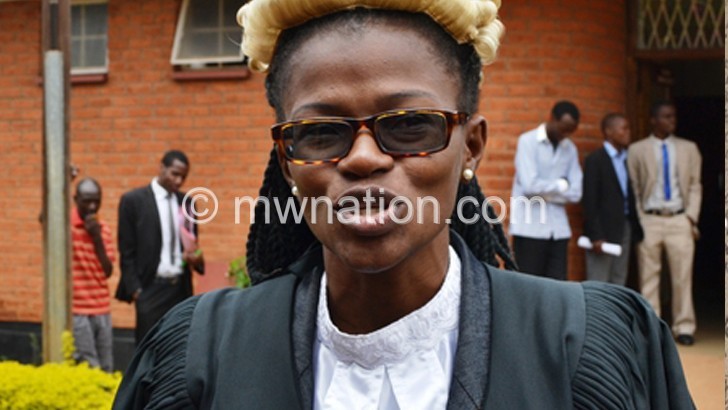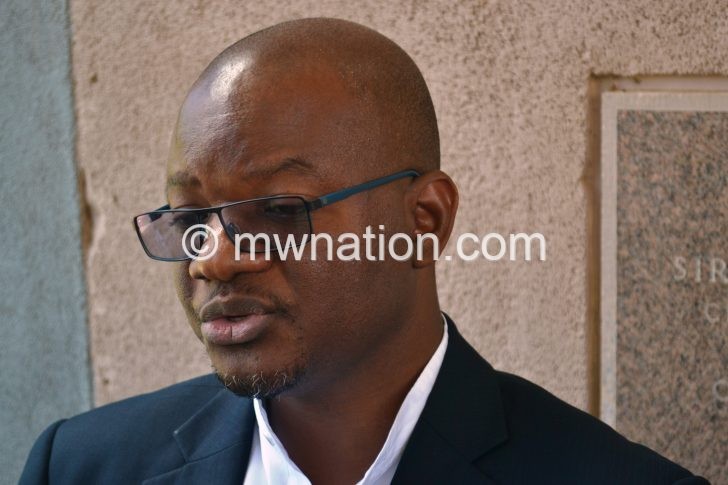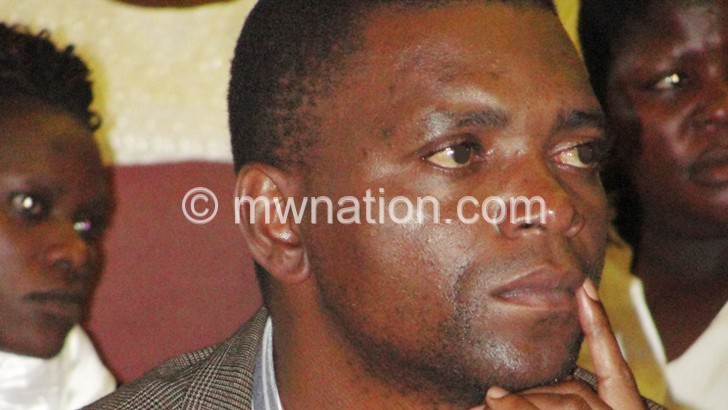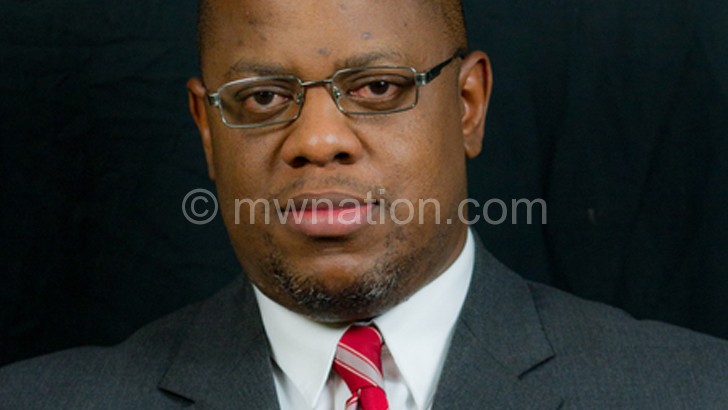DPP, ACB at war
- Kachale suggests Bureau is morally compromised
- Anti-graft body hits back at ‘disgusting’ allegations
Two agencies crucial to Cashgate cases—Director of Public Prosecutions (DPP) and the Anti-Corruption Bureau (ACB)—are at war, prompting the Ministry of Justice to try and broker a cease fire.

While DPP Mary Kachale accuses the ACB of being morally compromised in her report to the Legal Affairs Committee of Parliament (LAC); the Bureau’s deputy director general Reyneck Matemba dismisses the allegations as “vindictiveness” stemming from the DPP’s failed attempt to exercise power she does not legally have over the body.
LAC has since confirmed receiving the duelling reports—DPP’s account and ACB’s response to it—but declined to offer details of how far the parliamentary oversight body has gone on the matter’s hearings and recommendations on the way forward.
The bad blood and deep mistrust between the two agencies at the core of the Cashgate offensive could derail conclusion of the financial scam’s cases and further scuttle the broader fight against corruption in Malawi that official estimates say drains around a third of the national budget.

DPP and ACB’s work is symbiotic in the fight against graft; hence, an acrimonious relationship makes an already difficult task of battling corruption even harder, according to legal analysts Weekend Nation talked to yesterday.
For example, ACB needs the DPP’s consent to prosecute its cases while the latter partly relies on the former to investigate potential corruption to get proof for litigation although Fiscal Police can also help the DPP with gathering evidence on financial crimes.
In her report to LAC titled ‘Breaking the Silence on some of the challenges that have hampered speedy prosecutions of Cashgate cases’, DPP Kachale claimed that some State investigators and prosecutors are playing tricks with evidence mostly to protect suspects.
Kachale talked of a deeply entrenched culture of “calculated investigative failures” and what she called prosecutor-engineered acquittals that thwart what may otherwise be successful court prosecutions.

She explained that prosecutors conspire with investigators to engineer acquittals or discharges from court cases by purposefully excluding crucial evidence that undermines cases and the State’s push for a conviction.
Those being protected, according to the DPP, mostly include civil servants who were office holders in the notorious lootings that happened between the years 2009 and 2014 during which forensic auditors estimate that at least K236 billion may have been stolen.
The focus of investigations and prosecutions of cases from Cashgate—which has crippled public finances, chased away donors and sank taxpayer and investor confidence in the country’s systems—has been on the companies that allegedly got either inflated payments or received money for goods and services they never provided to government.
But the probes and litigations have largely left out public officials who processed and authorised what have emerged to be fraudulent payouts.

DPP’s lamentations
In her report, Kachale said when she assumed the DPP’s office in August 2014, her immediate task was to tackle Cashgate cases to prosecute all those involved in the scandal; help recover all the money stolen through the scam and bring to an end the culture of impunity in the public service.
But, according to her, achievement of these aims has been a tall order because of the strategy of concealment and sabotage practised by some of the very people hired to investigate and prosecute corruption suspects, especially Cashgate-related ones.
“While being an area with little or no documented research, it might be no exaggeration to suggest that in Malawi investigators and prosecutors wield so much power that they could easily insulate certain people from the ordinary operation of the law; hence, defeating the very notion of rule of law,” said Kachale.
She said it is this culture of investigators and prosecutors protecting civil servants that saw no public servant being convicted in the 2000-2001 K187 million education scam that she describes as fraud of striking similarities to what is today called Cashgate.
According to Kachale, history is repeating itself in the ongoing Cashgate litigations in which more energy is spent going after businesses that were conduits of the loot and little on the public officials that processed the paperwork, including payment authorisations and who might have been the ultimate beneficiaries.
“This meant that by August 2014, when I was made DPP, 14 years had lapsed since the first ‘Cashgate’ [education scam], but still no single public servant had ever been held accountable for their role. Armed with such knowledge, I formed the view that for a country in acute poverty; hence, in need of economic development to improve the quality of life of its citizens, holding public servants accountable through effective criminal prosecutions is not only a criminal justice measure, it is quite literally a life-saving intervention,” she said.
‘Proof’ of concealment
One of her claimed examples of ACB hiding documentary evidence that later proved critical in securing conviction when it was discovered, involves papers that were in the bureau’s possession, custody and control having been seized from Leonard Kalonga.
Apparently, someone told Fiscal Police in the course of their investigations around April 2015 that there was some evidence relevant to 2013 Cashgate cases that ACB as an institution had been aware of, but had not been brought out in evidence disclosures.
In their search, according to Kachale, Fiscal Police were told to look for the document ‘in a laptop bag behind’ a particular cabinet where a document was indeed found, but not necessarily the one they had originally been looking for.
The document nonetheless proved crucial in a Cashgate case involving one Staffold Mpoola, she said.
The document has a list of contractors, including sums of money as well as details of bank accounts, said the DPP.
On the back of those documents, she added in the report to LAC, are hand-written notes indicating abbreviations such as AGD and FIU, which are commonly known to be Accountant General’s Department and Financial Intelligence Unit respectively.
The document, she said, also contained cheques paid to Staffold Mpoola’s company.
“Leaving the other significance of the document—even if we just focus on Staffold Mpoola—we were curious to know how ACB investigators, after finding a document bearing actual sums of money paid to Staffold Mpoola and accurate bank names where the business held the account kept that document from [ACB top prosecutors],” she said.
Kachale said this question was relevant because ACB prosecutors had earlier indicated that there was, among other things, no evidence linking any civil servant to Mpoola, yet there was a document that ACB investigators found in Kalonga’s house that was brought to the attention of the bureau’s prosecutors.
Why, wondered the DPP, would such a critical document be kept away from the ACB prosecution team to the extent of jeopardising the just outcome of The Republic versus Staffold Mpoola case?
“When we raised such awkward questions, the relationship between my office and ACB took a turn for the worse,” claimed Kachale in the report.
ACB trashes DPP
But ACB’s Matemba—in his response to LAC—countered that most of the allegations contained in Kachale’s report are not only “baseless and childish, but also unprofessional, malicious and disgusting.”
Matemba also denied that ACB officials concealed any document mounted a spirited defence of his officers.
“As far as I am concerned, no bureau officer has ever concealed any document or evidence from me, or from any prosecutor handling Cashgate cases for purposes of weakening the cases that we are prosecuting. For DPP to make this allegation against bureau officers, is not only immoral, but an insult to the integrity and the hard-working and diligent spirit of bureau officers. I have not seen any evidence to support these allegations…
“My view on this issue has always been that this was simply a case of misfiling or misplacement of a document, and not concealment. We have a system in the bureau that is so transparent that it would be very unlikely for an officer [in fact outright foolishness for an officer] to attempt to conceal a document or evidence and expect to get away with it [or not to be discovered],” said Matemba.
He claimed as examples that documents can be misplaced not concealed by stating that on two separate occasions, two crucial documents that ACB submitted to the office of the DPP ended up missing and the ACB simply sent other copies without making noise about it.
When contacted for comment yesterday, DPP Kachale said she was on holiday and could not respond to the issues.
ACB director general Lucas Kondowe, when contacted for the bureau’s position on the matter on Thursday, also declined to comment.
But in an interview yesterday, LAC chairperson Maxwell Thyolera confirmed that the committee received the Kachale report that Weekend Nation has seen.
He said the DPP, in line with her constitutional requirement to report to his committee, highlighted a number of challenges that her office has been facing in the effort to prosecute Cashgate cases.
Thyolera also confirmed that ACB responded to the DPP’s allegations and the committee has been meeting the two bodies over the matter.
But he said: “Because we are arbitrating, it would be premature to give details on the matter. What I can say is that we are still doing that process.”
Earlier this month, Weekend Nation reported that LAC summoned top officers investigating and prosecuting the lingering Cashgate cases, but remained tight-lipped on the agenda and what the inquiries yielded.
In two separate meetings in Lilongwe, LAC members met with Kondowe and Matemba.
The committee also met Attorney General Kalekeni Kaphale and DPP Kachale.
However, two LAC members and one source at the ACB said yesterday that their initial assessment is that the DPP has a point, hence ACB investigators need to be probed.
“The challenges are at the low levels where the investigators are conniving with the culprits for lesser punishment or acquittals. What we have understood is that the investigators are holding back information or totally misinforming the prosecutors within the ACB or the DPP.
“The case in point is that of Kalonga where the DPP had to take ACB to court for information that ACB was holding. It was interesting to note that the deputy director of ACB was not aware of the said document, yet the document was within the ACB,” said one LAC member.
Experts’ alarm
Legal minds worry about the impact the acrimony will have on the fight against corruption generally and Cashgate in particular.
Private practice lawyer John Gift Mwakhwawa said in an interview yesterday that the feud between ACB and DPP does not represent a comforting and reassuring picture.
“When the two law enforcement arms of government clash it is not comforting. Without undermining the independence of ACB, the DPP can reasonably ask for any information that would help in a case and if ACB is not disclosing, the DPP can take the ACB to court in a case where she reasonably believes ACB is withholding,” he said.
Mwakhwawa said the manner in which ACB is handling Cashgate investigations is likely to erode public and donor confidence in the organisation.
University of Malawi’s Chancellor College law lecturer Edge Kanyongolo, in a separate interview yesterday, said it is critical that the two agencies cooperate for the sake of efficiency in the prosecution of Cashgate cases otherwise little can be achieved.
Of late, there have been concerns of slow progress in Cashgate cases and the projected recovery outturn, especially of the K24 billion that is suspected to have been looted between April and September 2013.
But there is even more money that is suspected to have been stolen during the five years leading to December 2014—initially estimated at K577 billion—but which is now down to K236 billion.
The snail’s pace at which the cases are being heard means that it would take years to finish prosecuting them—leaving hundreds of billions of taxpayers’ money to fate.
The DPP and ACB are leading the prosecution of 69 people suspected to have links to the missing of K24 billion from government coffers.
But there is little movement on the larger K236 billion potential heist, with progress on some 13 files that the National Audit Office (NAO) sent to ACB for investigations remaining elusive. n






I really like this Kachale lady, this is what we call patriotism at its best. And I totally agree with her obsevations and a very good example of cases where investigators have deliberately left out vital information is the Bakili Miluzi case……no wonder this case has drag for years.
And the question I have Mr Matemba since he has come out to defend the ACB is that…… why did you excuse yourself from the Muluzi case? What personal reasons did you have? What if everyone at the ACB had the same person reasons that you had what would happen to the Muluzi case?
Mr Matemba if you have any morals just do the right thing ……quit ACB. Mr Matemba is the most corrupt person at ACB and the person who betrayed Mr Njauju to be murdered……no wonder there is no good working relationship with his boss.
I am with her!©™
Where are you Peter ? Take leadership here.